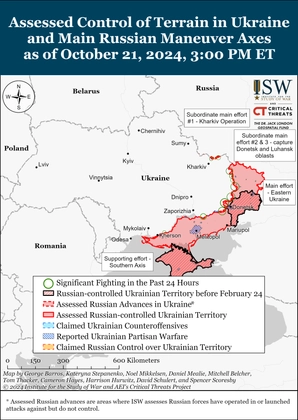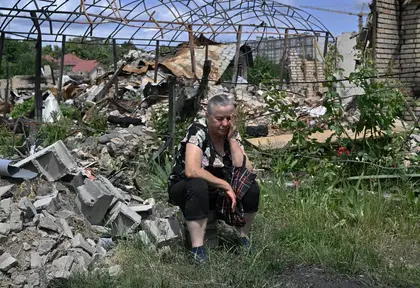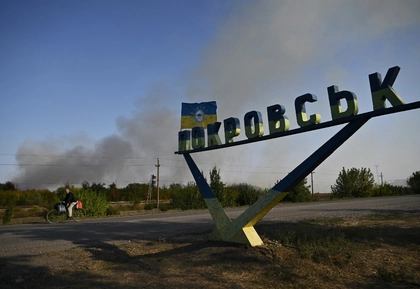Last week, Ukrainians, and friends of Ukraine throughout the world, were shocked by a series of outrageous statements from supposedly respectable international organizations. By rigorously pursuing some idealized concept of “impartiality” the International Red Cross and Amnesty International (among others) compromised not just themselves, but the values of humanism, common decency, and sensible ethics.
Why? Why would such respected organizations discredit themselves, and then defend their obviously untenable positions even in the face of widespread criticism?
JOIN US ON TELEGRAM
Follow our coverage of the war on the @Kyivpost_official.
One of the poorly understood aspects of this war, is the destabilizing effect that it has had on the philosophical foundations of the western institutional order. Russia’s unprovoked war in Ukraine, and the very public brutality of its soldiers, has undermined a fundamental principle on which western civilization is based: the belief that people are fundamentally good.
Here’s the problem: they’re not. No matter how difficult it is to accept, Evil exists.
Since Augustine and Acquinas, western philosophy has preached that Evil is simply the absence of Good, that Evil does not actually exist. Hegel and Heidegger supported this claim: Evil is privation, absence, deficiency of Good.
According to this view, Evil has no independent existence. Its manifestation is the result of disease or deviance. It can be treated by medication, education, correction. Sometimes individuals deviate from their natural state of goodness (due to psychological illness, social neglect, inequality), and they do things that are not good. Then they should be helped to right their ways.

ISW Russian Offensive Campaign Assessment, October, 22, 2024
In line with the Judeo-Christian tradition, Evil cannot exist as a separate ontological category because God exists. If one denies the existence of God then the existence of Evil becomes more plausible, but Atheists rarely get that far in their philosophies. For believers, God is omnipotent (capable of destroying evil) and omnibenevolent (infinitely good), so if God exists, Evil can exist only because of the inadequacy of the human will – as “sin” or error.
But as we see in this war, Evil exists not as a shortfall or defect. It has agency.
It exists in the Russian soldiers who massacred over 400 civilians in Bucha. It exists in the Russian soldiers who murdered women and children in Mariupol. It exists in the Russian soldiers who have raped infants and castrated Ukrainian POWs. It exists in the Russian field commanders who regularly order indiscriminate attacks on civilian houses, schools, hospitals…
Why Russians engage in such barbarism is beyond comprehension if one accepts established paradigms. This is not about sin or error. Their actions are pure Evil.
Russian barbarism cannot be healed or rectified. It is not a deficiency. It is a real manifestation of Evil: one that the ethical theories on which western civilization is based, cannot comprehend.
Naturally, the people who work for international organizations believe their work fosters Good. Their mission is to ensure impartial resolution (or at least relief) of conflict.
Because people are essentially good (so says the dominant paradigm) some measure of Good must be present in both sides of any conflict. Each side is said to have interests that reflect its own interpretations of “good”. In war, the job of a mediating organization is to find “balance” between the conflicting parties: to recognize the legitimacy of the interests of each side.
To admit that one of the parties is Evil (lacking any Good) would amount to a failure not only of the intermediary mission of the organization, but of the foundational values on which western institutions are built. It would amount to denying the potential decency (humanity) of one of the warring parties.
In this view, war is never cast as a conflict of good vs. evil. Its essence is a difference in interpretations of “good” – a disastrous form of misunderstanding. Differences between the warring sides can be “healed” because both are fundamentally seen as good. Hence, to mediate means to “balance”; to be impartial, publicly neutral.
On August 4th, Amnesty International issued a statement that quotes its Secretary General as saying “We have documented a pattern of Ukrainian forces putting civilians at risk and violating the laws of war when they operate in populated areas”. Clearly, the once respected international organization aimed to “balance” its previous denunciations of Russia with a public admonishment of Ukraine. Its leadership believes that some “good” is present in the actions of Russia and some “evil” (mistakes that can be rectified) is present on the Ukrainian side as well. Demonstrated neutrality can facilitate mediation and even eventual peace – so says the paradigm – because both sides have “sinned” and must see the error of their ways.
Understandably, this search for “balance” has caused outrage in Ukraine. On August 6th, Oksana Pokalchuk, the Director of Amnesty International Ukraine, resigned her position in protest against the position of the organization’s central office.
Like her, many Ukrainians are asking: when will the world wake up to the evil that is Russia? Why does the international community insist upon “balance” when this war is clearly black-and-white? When will they stop blaming the victim?
Previously, on August 3rd, in response to the staged bombing of Olenivka prison by Russian forces during which over 50 Ukrainian prisoners of war were killed and over 100 more injured, the International Red Cross issued a statement claiming the organization did not guarantee the safety of the POWs. Apparently, when Ukrainian forces in Mariupol were ordered to surrender, the Red Cross “facilitated the safe passage of combatants out of the Azovstal plant, in coordination with the parties to the conflict. Given they were then PoWs we registered their information… We did not guarantee the safety of the PoWs once in enemy hands because it is not within our power to do so.”
This sounds much like the reaction of western powers after Russia’s 2014 invasion of Ukraine: a justification for doing nothing based on strict adherence to written words in a document signed by the world’s major powers twenty years earlier. Then it was argued that the stipulations of the Budapest Memorandum did not actually guarantee Ukraine’s territorial integrity in exchange for its relinquishing nuclear weapons. The “security assurances” merely required the signatories to “consult in the event a situation arises”.
Consultations and diffused responsibility make sense if one believes in the fundamental goodness of homo sapiens: If POWs are counted and registered, they will be safe. If countries agree to respect each others’ borders, they will keep their promises. These conditional sentences seem sensible if each side respects human dignity, if agreements are worth the paper they are written on…
What if the signatory on a document has no respect for dignity? What if there is no intention to keep to the agreement? What if the concept of negotiating “in good faith” has not basis?
Closer to home: what if the enemy is fundamentally evil? What if their evil is not an aberration, but rather their essence?
The very possibility of these questions requires a total rethink of all that is foundational to western civilization; a recalibration of the paradigm on which international institutions have been constructed. That’s not an easy thing to do, but it must be done.
And Evil must be recognized for what it is. And destroyed.
The views expressed in this article are the author’s and not necessarily those of the Kyiv Post.
You can also highlight the text and press Ctrl + Enter







